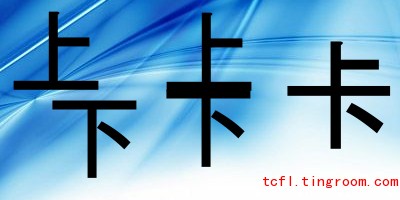However, with your language study progresses into higher level, you’ll slowly discovered that even if you know these two characters inside out, you still might find yourself in a situation that have no idea about what they really mean.
Today I wanna help you with some of their interesting occurrences and hopefully at the end of the post you’ll be able to boost your vocabulary a little.
The very first smart way of engaging
wǒ jǐnzhāng dé xīnli qīshàngbāxià de.
我 紧张 得 心里 七上八下 的. (I was so nervous that my heart beat went wild. :-) )
Please be aware,
Guess the above idiom is not that hard to digest. Now let’s have a look at a Chinese word that used the same concept to carve out “nervousness “. This time, all you need to think about is just place
tǎn tè
忐忑 ( fidgeting )
It’s almost the same meaning as
wǒ tǎntè dì zuò zàinar.
我 忐忑 地 坐 在那儿. (I was sitting there fidgeting.)
Now you might think, what if you’re stuck and can not either go up or go down, is there any words for that? Yes!
wǒ xiànzài de zhíwèi shì bù shàng bùxià de.
我 现在 的 职位 是 不 上 不下 的. (My current position is stuck in the middle. )
Or, simply smashing the two characters together into a new character:
For example,
tā de shǒu kǎzhù le!
他 的 手 卡住 了! (His hand got stuck!)
Now, let me know whether you know any words or idioms that are using
 English
English Japanese
Japanese Korean
Korean French
French German
German Spanish
Spanish Italian
Italian Arab
Arab Portuguese
Portuguese Vietnamese
Vietnamese Russian
Russian Finnish
Finnish Thai
Thai dk
dk
